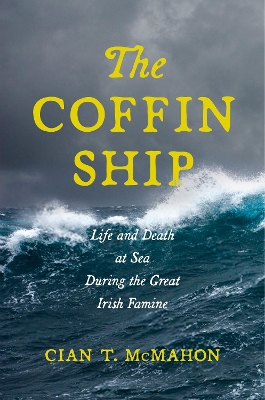Reviewed by annieb123 on
The Coffin Ship is a layman accessible academic look at the years of the Great Irish Famine written and presented by Dr. Cian T. McMahon. Released 1st June 2021 by NYU Press, it's 328 pages and is available in hardcover and ebook formats. This is the second book in the Glucksman Irish Diaspora Series.
This is a well written academic treatise, both harrowing and moving, of the Irish diaspora during the great famine of 1841-1851. This book, while academically rigorous and prodigiously annotated throughout is mostly accessible to non-academics. The language is understandable and readable and the author allows the subjects to speak eloquently for themselves, with many contemporaneous excerpts from diarists, historians, and the emigrants themselves.
The language is precise and academic, but not overly obfuscating or difficult. My own family history is closely tied to these trans-Atlantic emigrations, since the majority of both side of my family survived the crossings during and after the famines in Ireland. It was interesting to read a more balanced view of the transport ships and the experiences of people who lived through their own words and the data collected from the historical records left behind.
The book is arranged thematically by aspects of the journey: preparation, embarkation, life, death, and arrival. There are numerous useful appendices including an in-depth explanation of data, source, and methodology which give readers a helpful lesson in winnowing information and judging sources. The book is meticulously annotated throughout and the chapter notes and bibliography will provide readers with many (many!) hours of further reading.
This would be a useful and resource rich choice for public and school libraries, hobby genealogists, historians, and readers interested in allied subjects. I found the writing slightly academic and precise for a "pleasure" read, but appreciated the academic rigor and accuracy.
Five stars.
Disclosure: I received an ARC at no cost from the author/publisher for review purposes.
Reading updates
- Started reading
- 21 August, 2021: Finished reading
- 21 August, 2021: Reviewed
